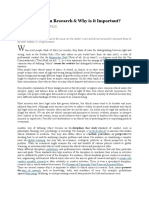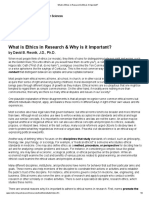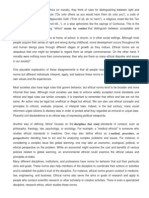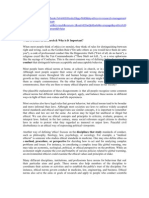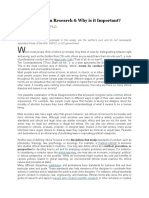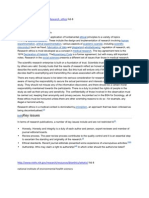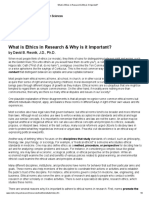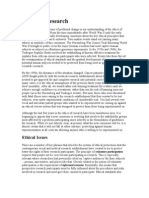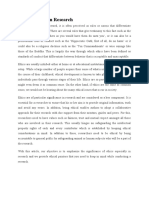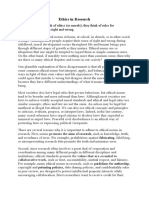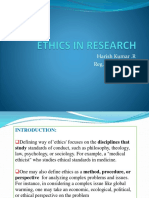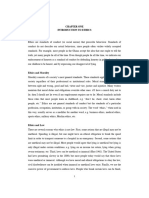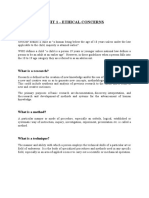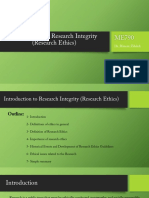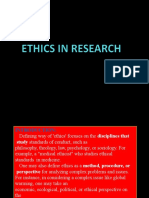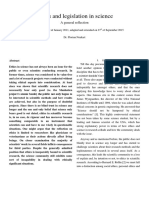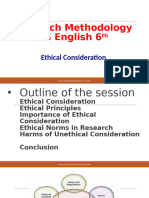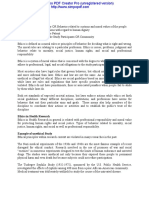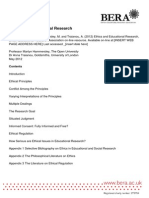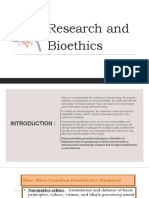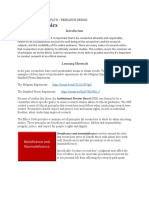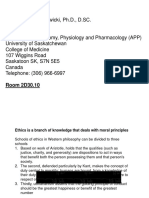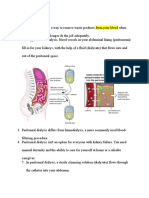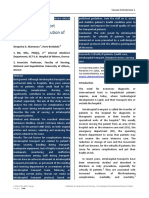Ethics of Research
Ethics of Research
Uploaded by
Usman DitucalanCopyright:
Available Formats
Ethics of Research
Ethics of Research
Uploaded by
Usman DitucalanOriginal Title
Copyright
Available Formats
Share this document
Did you find this document useful?
Is this content inappropriate?
Copyright:
Available Formats
Ethics of Research
Ethics of Research
Uploaded by
Usman DitucalanCopyright:
Available Formats
ETHICS OF RESEARCH
What is Ethics in Research & Why is it important?
When most people think of ethics (or morals), they think of rules for distinguishing between right and
wrong, such as the Golden Rule ("Do unto others as you would have them do unto you"), a code of professional
conduct like the Hippocratic Oath ("First of all, do no harm"), a religious creed like the Ten Commandments ("Thou
Shalt not kill..."), or a wise aphorisms like the sayings of Confucius. This is the most common way of defining
"ethics": norms for conduct that distinguish between acceptable and unacceptable behavior.
There are several reasons why it is important to adhere to ethical norms in research:
1. First, norms promote the aims of research, such as knowledge, truth, and avoidance of error. For example,
prohibitions against fabricating, falsifying, or misrepresenting research data promote the truth and
minimize error.
2. Second, ethical standards promote the values that are essential to collaborative work, such as trust,
accountability, mutual respect, and fairness. For example, many ethical norms in research, such as
guidelines for authorship, copyright and patenting policies, data sharing policies, and confidentiality rules
in peer review, are designed to protect intellectual property interests while encouraging collaboration.
3. Third, many of the ethical norms help to ensure that researchers can be held accountable to the public. For
instance, federal policies on research misconduct, conflicts of interest, the human subject’s protections, and
animal care and use are necessary in order to make sure that researchers who are funded by public money
can be held accountable to the public.
4. Fourth, ethical norms in research also help to build public support for research. People are more likely to
fund a research project if they can trust the quality and integrity of research.
5. Finally, many of the norms of research promote a variety of other important moral and social values, such
as social responsibility, human rights, animal welfare, compliance with the law, and public health and
safety. Ethical lapses in research can significantly harm human and animal subjects, students, and the
public. For example, a researcher who fabricates data in a clinical trial may harm or even kill patients and a
researcher who fails to abide by regulations and guidelines relating to radiation or biological safety may
jeopardize his health and safety or the health and safety of staff and students.
You might also like
- 28 Day Summer Shred - PagesDocument4 pages28 Day Summer Shred - Pagesjavi martinezNo ratings yet
- Role of Ethics in Modern Day Research Again SetDocument11 pagesRole of Ethics in Modern Day Research Again Setsana shabir100% (2)
- G.I. 6.003 - Incident Investigation PDFDocument11 pagesG.I. 6.003 - Incident Investigation PDFJoypee Macasampon50% (2)
- Service Manual: TigercatDocument458 pagesService Manual: TigercatalexNo ratings yet
- What Is EthicsDocument12 pagesWhat Is Ethicsspiteful sun50% (2)
- Split Case Pump MosDocument10 pagesSplit Case Pump MosFakhreddine Ezzahi100% (1)
- 10137099C00 Newport EC Certificate (Exp 28-Aug-2022)Document2 pages10137099C00 Newport EC Certificate (Exp 28-Aug-2022)Rareș Andrei OnelNo ratings yet
- Why Are Ethics Important in ResearchDocument8 pagesWhy Are Ethics Important in Research14004No ratings yet
- What Is Research Ethics?Document7 pagesWhat Is Research Ethics?Nadie Lrd100% (1)
- What Is Ethics in Research & Why Is It Important?: by David B. Resnik, J.D., PH.DDocument2 pagesWhat Is Ethics in Research & Why Is It Important?: by David B. Resnik, J.D., PH.DChandraKurniawanNo ratings yet
- Research EthicsDocument10 pagesResearch EthicsPrashant KumarNo ratings yet
- What Is Ethics in Research & Why Is It ImportantDocument9 pagesWhat Is Ethics in Research & Why Is It ImportantShant Chougule100% (3)
- Ethics in ResearchDocument13 pagesEthics in ResearchVibhuti SinghNo ratings yet
- Ethical Issues in Business Research: Aims of Research FabricatingDocument2 pagesEthical Issues in Business Research: Aims of Research FabricatingAnonymous XT2OEpJFNo ratings yet
- What Is Ethics in Research & Why Is It Important?Document11 pagesWhat Is Ethics in Research & Why Is It Important?Denilyn CortezNo ratings yet
- What Is Ethics in Research and Why Is It ImportantDocument19 pagesWhat Is Ethics in Research and Why Is It ImportantwidyaNo ratings yet
- ResearchDocument9 pagesResearchNagarajan CheyurNo ratings yet
- Ethics in ResearchDocument19 pagesEthics in ResearchIntan Putri UtamiNo ratings yet
- What Is Ethics in Research and Why It Is ImportantDocument4 pagesWhat Is Ethics in Research and Why It Is ImportantLunar WalkerNo ratings yet
- What Is Ethics in ResearchDocument9 pagesWhat Is Ethics in ResearchDAP UNDIPXIIINo ratings yet
- O O O O O OO O " Oo# $ O% ODocument10 pagesO O O O O OO O " Oo# $ O% OGerardo Jose CatanguiNo ratings yet
- What Is Ethics in Research & Why Is It ImportantDocument9 pagesWhat Is Ethics in Research & Why Is It ImportantAnonymous zR8P8LexNo ratings yet
- What Is Ethics in ResearchDocument19 pagesWhat Is Ethics in ResearchHany'an RohsNo ratings yet
- Ethics in ResearchDocument21 pagesEthics in Researchmukku_raviNo ratings yet
- Ethics in ResearchDocument12 pagesEthics in ResearchVidhi Abrol100% (4)
- Role of Ethics in ResearchDocument3 pagesRole of Ethics in ResearchDiana Wangamati100% (1)
- Kinds of Personnel ResearchDocument7 pagesKinds of Personnel ResearchcharinamolinaNo ratings yet
- The Ethical Context of ResearchDocument9 pagesThe Ethical Context of ResearchArianne FarnazoNo ratings yet
- Ethical Issues in Nursing Research Module OverviewDocument33 pagesEthical Issues in Nursing Research Module OverviewMichelle Ann GacudNo ratings yet
- 87 - Kaustubh ShrivastavaDocument4 pages87 - Kaustubh ShrivastavaRohan HiremathNo ratings yet
- Harish Kumar .R Reg - No:11msb0050Document12 pagesHarish Kumar .R Reg - No:11msb0050Earl John FranciscoNo ratings yet
- Harish Kumar .R Reg - No:11msb0050Document12 pagesHarish Kumar .R Reg - No:11msb0050Maruko ChanNo ratings yet
- Course Notes, Bioethics - Chapter 1-3Document19 pagesCourse Notes, Bioethics - Chapter 1-3Riga EmmanuelNo ratings yet
- Final Assignment No. 2 Research in EducationDocument26 pagesFinal Assignment No. 2 Research in EducationAbdul GhafoorNo ratings yet
- Ethics Lecture Notes v1Document21 pagesEthics Lecture Notes v1Samuel AcquahNo ratings yet
- Unit 1 Ethical ConcernsDocument10 pagesUnit 1 Ethical ConcernsDhruv ShahNo ratings yet
- Ethics in Scientific ResearchDocument9 pagesEthics in Scientific ResearchgnasserNo ratings yet
- Introduction To Research Integrity (Research Ethics) ME790: Dr. Hazem ZibdehDocument13 pagesIntroduction To Research Integrity (Research Ethics) ME790: Dr. Hazem ZibdehAnas ShatnawiNo ratings yet
- Ethics in Research: Ann Cleo A. Acibar Rona Rose L. Alejo Bsed Iii - EnglishDocument16 pagesEthics in Research: Ann Cleo A. Acibar Rona Rose L. Alejo Bsed Iii - EnglishAngelique R. Bartolome100% (1)
- Ethical Issues in ResearchDocument10 pagesEthical Issues in ResearchAsad ArshadNo ratings yet
- What Are Research Ethics?Document8 pagesWhat Are Research Ethics?Raymala RamanNo ratings yet
- Ethics in NursingDocument12 pagesEthics in NursingHamza IshtiaqNo ratings yet
- Introduction To EthicsDocument11 pagesIntroduction To EthicsNurun NabiNo ratings yet
- Ethical Considerations in Action ResearchDocument2 pagesEthical Considerations in Action ResearchKoustav TalukdarNo ratings yet
- Introduction To Error AnalysisDocument2 pagesIntroduction To Error Analysism-872334No ratings yet
- 2023 - Research Integrity Ethics - Scientific Misconduct - IMPDocument15 pages2023 - Research Integrity Ethics - Scientific Misconduct - IMPBinduNo ratings yet
- Research Papers Ethical TheoriesDocument4 pagesResearch Papers Ethical Theoriesfvf6r3ar100% (1)
- Res701: Research Methodology (3:0:0:3)Document22 pagesRes701: Research Methodology (3:0:0:3)Karthick PrasadNo ratings yet
- Research Ethics: Research Ethics Involves The Application of Fundamental Ethical Principles To A VarietyDocument4 pagesResearch Ethics: Research Ethics Involves The Application of Fundamental Ethical Principles To A Varietywali ahmedNo ratings yet
- Ethics and Legislation in Scientific ResearchDocument5 pagesEthics and Legislation in Scientific ResearchDr. Florian NeukartNo ratings yet
- Research Methodology 3Document18 pagesResearch Methodology 3Khurram MalikNo ratings yet
- Ethics ResearchDocument11 pagesEthics ResearchSaddichhya TripathiNo ratings yet
- Ethics and Educational Research PDFDocument40 pagesEthics and Educational Research PDFahmad syahroniNo ratings yet
- Bioethics and Research PowerpointDocument37 pagesBioethics and Research PowerpointSusan Maglaqui100% (2)
- Research Ethics (Aanand) FinalDocument11 pagesResearch Ethics (Aanand) FinalNaman DadhichNo ratings yet
- Chapter 4Document13 pagesChapter 4jaydenetaylanraman3No ratings yet
- Mgt600 Unit 3 IntellipathDocument83 pagesMgt600 Unit 3 IntellipathDonna De JesusNo ratings yet
- Research EthicsDocument14 pagesResearch Ethicsjackelyn.fuentesNo ratings yet
- RPE 03 Publication Ethics (7 HRS)Document12 pagesRPE 03 Publication Ethics (7 HRS)smita.gumasteNo ratings yet
- CPPS 337.3 Ethical Issues in Medical Research, Handouts, September 2020Document28 pagesCPPS 337.3 Ethical Issues in Medical Research, Handouts, September 2020TinaNo ratings yet
- Belmont Report On PDFDocument13 pagesBelmont Report On PDFfoyet juluisNo ratings yet
- Research Methods Sa2 EssayDocument4 pagesResearch Methods Sa2 EssayKawaii KittenNo ratings yet
- Ethics, Qualitative And Quantitative Methods In Public Health ResearchFrom EverandEthics, Qualitative And Quantitative Methods In Public Health ResearchNo ratings yet
- The Seven Challenges Activity Book: Robert Schwebel, PH.DDocument13 pagesThe Seven Challenges Activity Book: Robert Schwebel, PH.DAhmad Aliansyah MNo ratings yet
- TFN Imogene Martina KingDocument7 pagesTFN Imogene Martina KingANJELO CYRUS BIARES GARCIANo ratings yet
- Pedia NotesDocument36 pagesPedia NotesmelNo ratings yet
- Spa With AcknowledgmentDocument2 pagesSpa With AcknowledgmentTRYX AMADEA NARRANo ratings yet
- Bmi Grade10 Jan.Document34 pagesBmi Grade10 Jan.Berith Grace Magcalas-GallardoNo ratings yet
- COVID-19 - Diagnosis - UpToDateDocument34 pagesCOVID-19 - Diagnosis - UpToDateDuy Hùng HoàngNo ratings yet
- Peritoneal DialysisDocument3 pagesPeritoneal DialysisGoh Kek Boon100% (1)
- Hs Committees Part1Document30 pagesHs Committees Part1Tan Chi SianNo ratings yet
- 00.module Cover General Physiology and ToxicologyDocument6 pages00.module Cover General Physiology and ToxicologyChryselleNo ratings yet
- Ondansetron For Pediatric GastroenteritisDocument3 pagesOndansetron For Pediatric GastroenteritisAgiana PratamaNo ratings yet
- Iloilo City Regulation Ordinance 2017-087Document5 pagesIloilo City Regulation Ordinance 2017-087Iloilo City Council0% (1)
- CSPELCRIME1Document2 pagesCSPELCRIME1johnpaulacostaNo ratings yet
- NFPA 101 Essentials Training Module 1Document8 pagesNFPA 101 Essentials Training Module 1Alejo SztybelNo ratings yet
- Answer UtsDocument6 pagesAnswer Utsjeromedeiparine8No ratings yet
- Selective Mutism QuestionnaireDocument2 pagesSelective Mutism QuestionnaireLidia RiveraNo ratings yet
- Intrahospital Transport Policies The Contribution of The NurseDocument13 pagesIntrahospital Transport Policies The Contribution of The NursededeNo ratings yet
- CGHS Farmacist Recruitment 2021 1Document4 pagesCGHS Farmacist Recruitment 2021 1Lucky LalitNo ratings yet
- T.Me/Nimishamam: Follow Us On English With Nimisha BansalDocument22 pagesT.Me/Nimishamam: Follow Us On English With Nimisha BansalAbhijit NathNo ratings yet
- Reference Manual of Vedic AstrologyDocument350 pagesReference Manual of Vedic AstrologyZoraidaMustafaHoldonattiNo ratings yet
- Learning Activity SheetDocument4 pagesLearning Activity SheetUnard Jv CasimeroNo ratings yet
- INOA Supreme With ODS2 Color ChartDocument6 pagesINOA Supreme With ODS2 Color ChartbinreNo ratings yet
- Abstinence in ReligionDocument3 pagesAbstinence in ReligionnieotyagiNo ratings yet
- Tips For Oily Skin CareDocument5 pagesTips For Oily Skin CareAminaNo ratings yet
- Leukemia 2Document52 pagesLeukemia 2Luthfia WardhaniNo ratings yet
- Penal Code Amendment Act No. 22 of 1995Document19 pagesPenal Code Amendment Act No. 22 of 1995Buhuni HimansaNo ratings yet









